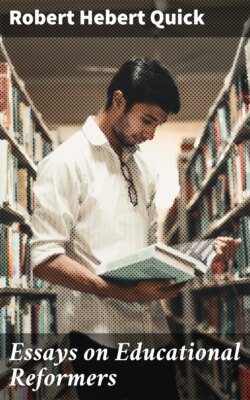Читать книгу Essays on Educational Reformers - Robert Hebert Quick - Страница 10
На сайте Литреса книга снята с продажи.
ОглавлениеMr. Walter Besant by his Readings in Rabelais (Blackwood, 1883), has put Rabelais’ wit and wisdom where we can get at most of it without searching in the dung-hill. But he has unfortunately omitted Gargantua’s letter to Pantagruel at Paris (book ij, chap. 8), where we get the curriculum as proposed by Rabelais, a chapter in which no scavenger is needed.
I will give some extracts from it:—
“Although my deceased father of happy memory, Grangousier, had bent his best endeavours to make me profit in all perfection and political knowledge, and that my labour and study was fully correspondent to, yea, went beyond his desire; nevertheless, the time then was not so proper and fit for learning as it is at present, neither had I plenty of such good masters as thou hast had; for that time was darksome, obscured with clouds of ignorance and savouring a little of the infelicity and calamity of the Goths, who had, wherever they set footing, destroyed all good literature, which in my age hath by the Divine Goodness been restored unto its former light and dignity, and that with such amendment and increase of knowledge that now hardly should I be admitted unto the first form of the little grammar school boys (des petits grimaulx): I say, I, who in my youthful days was (and that justly) reputed the most learned of that age. Now it is that the old knowledges (disciplines) are restored, the languages revived. Greek (without which it is a shame for any one to call himself learned), Hebrew, Chaldee, Latin. Printing (Des impressions) too, so elegant and exact, is in use, which in my day was invented by divine inspiration, as cannon were by suggestion of the devil. All the world is full of men of knowledge, of very learned teachers, of large libraries; so that it seems to me that neither in the age of Plato, nor of Cicero, nor of Papinian was there such convenience for studying as there is now. I see the robbers, hangmen, adventurers, ostlers of to-day more learned then the doctors and the preachers of my youth. Why, women and girls have aspired to the heavenly manna of good learning ... I mean you to learn the languages perfectly first of all, the Greek as Quintilian wishes, then the Latin, then Hebrew for the Scriptures, and Chaldee and Arabic at the same time; and that thou form thy style in Greek on Plato, in Latin on Cicero. Let there be no history which thou hast not ready in thy memory, in which cosmography will aid thee. Of the Liberal Arts, geometry, arithmetic, music, I have given thee a taste when thou wast still a child, at the age of five or six [Pantagruel was a giant, we must remember]; carry them on; and know’st thou all the rules of astronomy? Don’t touch astrology for divination and the art of Lullius, which are mere vanity. In the civil law thou must know the five texts by heart.
“ ... As for knowledge of the works of Nature, I would have thee devote thyself to them so that there may be no sea, river, or spring of which thou knowest not the fishes; all the birds of the air, all the trees, forest or orchard, all the herbs of the field, all the metals hid in the bowels of the earth, all the precious stones of the East and the South, let nothing be unknown to thee.
“Then turn again with diligence to the books of the Greek physicians, and the Arabs, and the Latin, without despising the Talmudists and the Cabalists; and by frequent dissections acquire a perfect knowledge of the other world, which is Man. And some hours a-day begin to read the Sacred Writings, first in Greek the New Testament and Epistles of the Apostles; then in Hebrew the Old Testament. In brief, let me see thee an abyss and bottomless pit of knowledge, for from henceforth as thou growest great and becomest a man thou must part from this tranquillity and rest of study ... And because, as Solomon saith, wisdom entereth not into a malicious mind, and science without conscience is but the ruin of the soul, thou shouldst serve, love, and fear God, and in Him centre all thy thoughts, all thy hope; and by faith rooted in charity be joined to Him, so as never to be separated from Him by sin.”
The influence of Rabelais on Montaigne, Locke, and Rousseau has been well traced by Dr. F. A. Arnstädt. (François Rabelais, Leipzig, Barth, 1872.)
